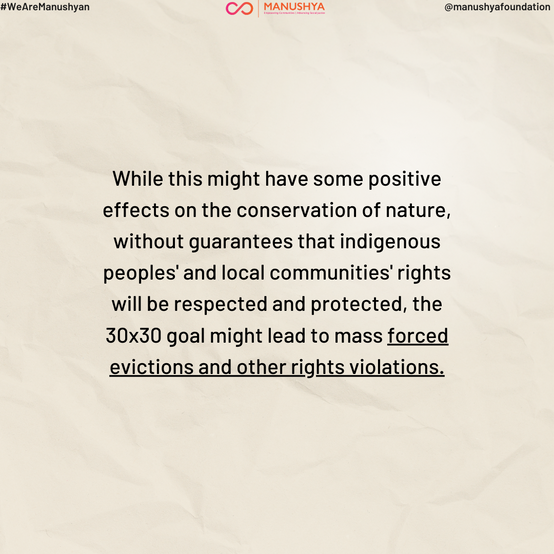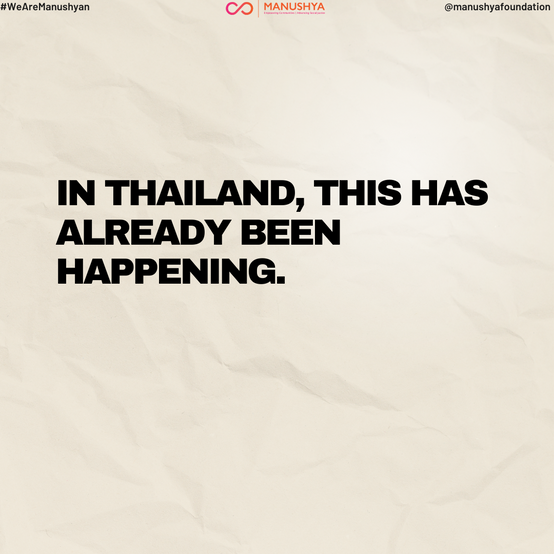What will the new global biodiversity plan mean for communities in Thailand?
Last week, the UN Geneva Biodiversity Meetings were concluded. The round of talks was a prequel to the Conference of Parties to the Convention on Biological Diversity (COP15) that will take place later this year in Kunming, China. While not widely covered by Thai media and largely passed over by the Thai public, the outcome of this biodiversity meeting will have far-reaching consequences on lives of people in Thailand.
What's the purpose of COP15?
In 2010, the State parties to the Convention on Biological Diversity agreed on the Strategic Plan for Biodiversity 2011–2020 and the Aichi Targets. It was a global framework that set up the most important priorities in conservation of biological diversity, its sustainable use and fair and equitable sharing of its benefits. According to the priority areas of the Strategic Plan, individual States were supposed to create their own national action plans that would contribute to the global implementation by 2020.
In mid-2020, the United Nations issued the Global Biodiversity Outlook 5, a report tracking the progress in implementation of the Aichi targets. The report confirmed that none of the targets would be met on the global level.
COP15 was originally planned for 2020 but was rescheduled due to the global Covid-19 pandemic to 2022. This round of negotiations will create the new Global Biodiversity Framework with a new set of targets needed to tackle the global biodiversity crisis.
Human rights concerns
The importance of healthy environment to protect and fulfill human rights has been proven many times over, most recently in the resolution of the Human Rights Council on the right to clean, healthy and sustainable environment. Biological diversity is no different. Rich ecosystems provide life-sustaining benefits to communities dependent on them and destruction equals jeopardizing their own existence. So why should, then, the Global Biodiversity Framework envisioned to better protect world's biodiversity, represent a threat to human rights?
Conservation of biodiversity and natural environment has not always been supportive of communities that live in symbiosis with these very ecosystems. In Thailand, we have witnessed whole communities being evicted from their homes in the name of flawed conservation and climate mitigation policies. Two cases in point are those of Sab Wai and Bangkloi villagers.
Sab Wai villagers from Thailand's Isaan region (Chaiyaphum province) have lived in their village since the 1970s. They live off subsistence farming, growing food for their own consumption and selling the overplus crop such as climate-resilient cassava. The community lived in peace even during the time of establishment of Sai Thong National Park in 1992 that now covers the area of their village.
However, since 2015, Sab Wai villagers became targets of flawed forest conservation laws and policies. The community was blamed for forest encroachment and its destruction and was requested to take down all the structures on the disputed land. The legislative framework supposed to protect forests against large-scale investors and businesses targeted this impoverished community instead.
The villagers were eventually convicted under Forest Act (1941), National Park Act (1961), and National Reserved Forests Act (1964) for trespassing, encroachment and clearing land belonging to the National Park. In 2021, the Supreme Court confirmed the verdicts of courts of lower instances, sentenced 11 villagers to suspended jail terms while imprisoning the remaining 3 of them.
Almost a year after the Supreme Court verdicts, villagers are in a grave danger of forced evictions that would make them homeless and throw them into extreme poverty.
(VIDEO) Learn more about the Sab Wai villagers' case here.
In February 2021, Kaeng Krachan National Park authorities forcibly moved around 100 indigenous Karen villagers from their homes in the Bangkloi - Jai Pandin highland, unfairly accusing them of forest encroachment within Kaeng Krachan National Park (KKNP in Phetchaburi and Prachuap Khiri Khan Provinces).
On 5 March 2021, 22 members of the indigenous Karen community in Bangkloi - including women and a disabled person – were arrested by Thai national park authorities and were detained in prison for returning to their ancestral land in the Kaeng Krachan forest. They were released under the condition that they would not return to the area. This has put the whole community in a considerably difficult situation.
Villagers are facing malnutrition as a result of having no access to their ancestral subsistence (foraging natural resources and rotational farming). They are also facing health risks and loss of income as Karen villagers were forced to resettle and struggled to farm infertile land. Young villagers had to work in cities to feed their families, but the spread of COVID-19 limited their income. Returning to their ancestral land within Kaeng Krachan National Park turned out to be the last and only option.
However, on 26 July 2021, UNESCO declared the National Park a World Heritage Site, ignoring the pleas of the indigenous Karen who currently cannot enter the area. Furthermore, Phetchaburi provincial prosecutors have prepared an indictment against 27 Bangkloi villagers on 18 August 2021.
Learn more about the Bangkloi villagers' case here.
The new Global Biodiversity Framework
Cases of Sab Wai and Bangkloi villagers are textbook examples of mismanaged nature conservation that disregards human rights. While such cases have already been taking place all over the world, the new Global Biodiversity Framework might further aggravate the crisis if the final text does not take into account human rights of indigenous and local communities.
Right to self-determination, secure land tenure and the free, prior and informed consent must become integral components of this new framework. Such human-rights approach will not only protect community rights but will also significantly contribute to the framework goals in protecting world's biodiversity. The evidence shows that when indigenous and local communities' rights are recognized and protected, these communities provide some of the most efficient forms of protection to the world's nature.
The Geneva meetings in March brought hope for indigenous and local communities who were very active during the negotiations. So far, their rights are recognized in the draft text of the framework and no direct opposition has been raised.
Thailand: Quo vadis?
Dr. Benchamaporn Wattanatongchai, Senior Professional Environmentalist at the Office of Natural Resources and Environmental Policy and Planning (ONEP) and member of the Thai delegation at the Geneva meeting signalled that Thailand will follow the lead of the final Global Biodiversity Framework in its new Master Plan for Integrated Biodiversity Management. But even if the crucial clauses on rights of indigenous and local communities are integrated in the final text of the global framework, Thailand will have to overcome its own structural bottlenecks to ensure human rights protection of forest-dependent communities.
Firstly, Thailand does not officially recognize status of indigenous peoples. While it voted in support of the UN Declaration on the Rights of Indigenous Peoples in 2007, it claimed during its latest CERD Review that there are no “indigenous peoples” in Thailand because “indigenous peoples” are those who had lived in the area before the colonial period, which is not applicable to Thailand.
Through the repeated denial of indigenous peoples' existence in its territory, Thailand attempts to cover up its failure to recognize their inherent right to their ancestral lands, free, prior and informed consent with matters concerning them and their right to self-determination. Any future policies and laws on conservation of biodiversity must integrate these rights on the national level.
Second, governmental agencies responsible for biodiversity management in Thailand include agencies that have in the past actively acted against interests of indigenous and local communities and became involved in serious human rights abuses against them.
Both the Royal Forest Department and the Department of National Parks, Wildlife and Plant Conservation (DNP) were involved in the case of Sab Wai villagers being evicted from their lands.
The DNP is also accountable for threats of evictions and to physical security made by Sai Thong National Park officials during their frequent visits to homes of accused Sab Wai villagers.
Importantly, the DNP is also linked to the disappearance of a land rights defender Porlajee Rakchongcharoen 'Billy' who participated in legal proceedings against the DNP following a forced resettlement of his indigenous Karen community from their lands in the Kaeng Krachan National Park. In 2016, the DNP was ordered to pay a fine of TBH 300,987 (USD 9,120) at the Supreme Administrative Court for “over-exercise of power” after burning down shelters and other structures of six indigenous Karen in the Kaeng Krachan National Park. Other land disputes involving the DNP and Chao Lay indigenous peoples occurred on Lipe, Adang and Rawee islands.
Finally, effective implementation of the Global Biodiversity Framework that respects, protects and fulfills rights of indigenous and local communities will require truly democratic governance and space for meaningful participation of rights-holders potentially affected by the framework. However, Thailand currently does not possess that space.
The draft law on the operation of NGOs, might completely destroy the NGO sector in Thailand, if adopted. The criminal defamation provisions in Thai legislation haunt activists and human rights defenders across the country while the Government failed to commit to their amendment. The Government also weaponizes the Covid-19 Emergency Decree against peaceful protesters defending their human rights such as Bangkloi villagers or pro #MarriageEquality protesters.
We celebrate success of the world's indigenous peoples and local communities in bringing the attention and gathering support for their rights in the Global Biodiversity Framework. However, in Thailand, more battles are to be fought even if human-rights approach is integrated in the global framework. Thai national legislative and policy framework on biodiversity must truly integrate a human-rights approach that will ensure that indigenous and local communities are supported in their invaluable contributions as guardians of the forest, rather than criminalized.
.png)




















Comments